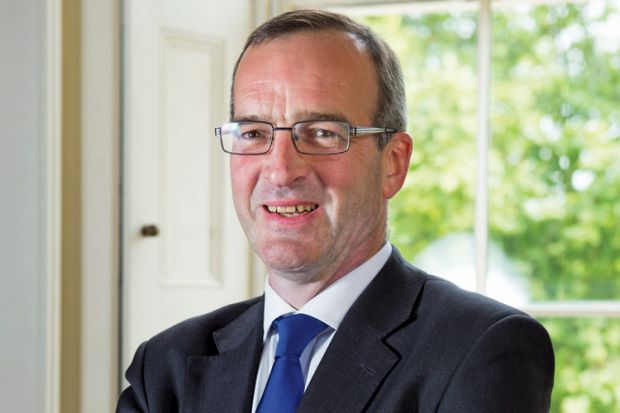The former civil servant who has taken the helm at the British Academy has spoken of his wish to see the organisation become a much “bigger player” in wider social policy issues – while also diversifying its membership.
Until recently director of the Scotland Office, Alun Evans said that he had much appreciated the value of non-partisan “academic input to policy” when the two sides had become “very polarised in their views” in the lead-up to the referendum on independence.
He said that in his new role therefore, he hoped to see the academy get more involved in policy formation, particularly “the big cross-cutting issues such as climate change, cities, obesity and migration”.
In areas such as the value of modern foreign languages and quantitative research methods where the British Academy has already produced powerful reports, Mr Evans is also keen to avoid letting them gather dust (or commissioning further reports): “That’s a pretty fair challenge that I want to take up: we’ve got this good report, the argument has been made, why isn’t anything happening?”
These are laudable aims, but they come up against a problem of “diversity”. Not only is the academy often perceived as elderly and patrician, it is largely lacking in expertise in social media, never mind hip hop or pornography, surely essential for tackling questions of bullying, body image and many other urgent social issues.
“That is a perfectly legitimate challenge there,” agreed Mr Evans. “The academy has done pretty well, as I see it, in terms of better gender equality – last year more than 50 per cent of the [42] new fellows were women. We need to do better in terms of black and ethnic minorities. We also need to be aware of the risk of being too pro the golden triangle [of London and Oxbridge].”
Given that people are now elected to the fellowship in their mid-fifties, on average, Mr Evans sees a need “to be careful not to discriminate against the young. So long as people have produced works of rigour and high intellectual skill, get them involved earlier. That is something we need to do consistent with the fact that the fellowship is the ultimate accolade.”
Although new fellows are elected by the current cohort, Mr Evans wants to “ensure they don’t select from a less diverse pool than necessary. Good statistics on diversity are essential to good decision-making.”
It is obviously difficult for an expert on social media, for example, to satisfy traditional criteria of excellence such as a 20-year track record of publication. Mr Evans sees it as essential to find new ways of recognising and evaluating such scholars.
Meanwhile, Mr Evans, who was at the Department for Business, Innovation and Skills working on the science and research settlement ahead of the last major government spending review, now finds himself on the other side of the fence and fighting to ensure that the academy gets “as good a settlement as possible”.
“The budget is relatively small,” he said, “but it buys quite a lot. We make a lot of smaller grants, which often lever in further resources and further thinking. We deploy the resources from the fellowship pretty much pro bono. The fellows don’t charge for their advice. That’s quite a valuable resource for anyone interested in the development of thinking and ideas.”
POSTSCRIPT:
Print headline: Under-55s welcome to apply for the ‘ultimate accolade’
Register to continue
Why register?
- Registration is free and only takes a moment
- Once registered, you can read 3 articles a month
- Sign up for our newsletter
Subscribe
Or subscribe for unlimited access to:
- Unlimited access to news, views, insights & reviews
- Digital editions
- Digital access to THE’s university and college rankings analysis
Already registered or a current subscriber? Login





